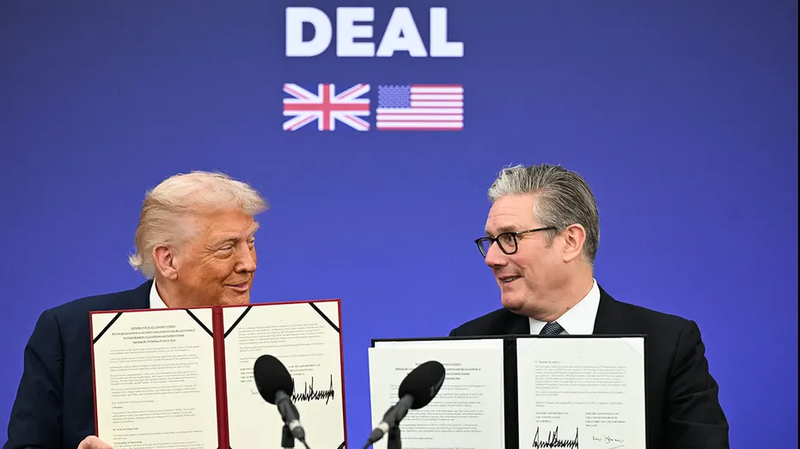
When President Donald Trump unveiled a $350 billion technology partnership with the United Kingdom, it was widely reported as a historic investment designed to revitalize Britain’s artificial intelligence (AI) and tech infrastructure. But beyond the sheer size of the deal lies a deeper strategic purpose: countering China’s expanding grip on global technology and infrastructure.
This pact — involving Microsoft, Google, Amazon, and other U.S. tech leaders — is not simply about jobs or innovation. It is a defensive wall against Beijing’s ambition to dominate AI, cloud services, and critical infrastructure across Europe and beyond.
According to the White House, the funds will flow into supercomputers, AI data centers, and quantum research in the U.K., providing Britain with the tools it needs to reassert itself as a major tech hub. The urgency is clear. Over the past decade, Chinese state-backed companies have bought into the U.K.’s core infrastructure:
Without decisive countermeasures, Britain risked becoming dependent on foreign powers for its technological backbone. Trump’s deal reverses the tide by injecting American capital and expertise into the heart of the U.K.’s tech future.
This move must be seen in the context of China’s broader global strategy. From Africa to Europe, Beijing has combined supply-chain dominance with heavy foreign investment to secure long-term influence.
Reports show that Huawei, Alibaba, and Tencent control around 35% of Germany’s cloud computing infrastructure. That level of control brings serious risks: potential surveillance, intellectual property theft, and even the ability to cripple systems during times of crisis.
In the U.K., similar risks were mounting. A Chatham House study warned that China could use its growing technological power to gain a position of global dominance comparable to Britain’s in the 19th century or America’s in the 20th.
AI is not just about apps or social media algorithms. It is at the center of national security, financial markets, defense systems, and healthcare innovation. Whoever controls AI infrastructure controls the future of innovation itself.
China knows this. Its “Made in China 2025” plan and “Digital Silk Road” initiative are designed to entrench Beijing’s role as a global tech supplier, ensuring that other nations cannot function without Chinese platforms.
That’s why the U.S.–U.K. tech pact matters. By establishing a transatlantic AI and cloud ecosystem free of Chinese influence, Washington and London are building resilience not only for themselves but also for the broader democratic world.
During World War II, American Lend-Lease aid kept Britain afloat as it stood against Nazi Germany. Today’s version of Lend-Lease is not tanks or bombers, but billions of dollars in AI servers, quantum processors, and cloud facilities.
As Trump reminded Britain’s leaders, “Together we’ve done more good for humanity than any two countries in all of history.” That cooperation now extends to the new frontier of global competition: the technology stack.
For the U.S., this is not simply about helping an ally. China’s penetration of European infrastructure creates direct risks for American security:
This is why vigilance is critical. Every Chinese acquisition or stake in Western technology is not just business — it’s a potential Trojan horse.
The U.S.–U.K. deal highlights a pathway forward:
Trump’s $350 billion tech pact with Britain is not only an economic partnership. It is a geostrategic lifeline, aimed squarely at preventing China from embedding itself deeper into Europe’s technological future.
For Americans, the lesson is simple: our future security depends as much on data centers and AI algorithms as it does on aircraft carriers and missiles. If China controls the technology backbone of our allies, U.S. safety, prosperity, and values are at risk.
This deal is a reminder that the U.S. cannot afford complacency. China is playing a long game, and America must match it with equal resolve. The Anglo-American partnership has always stood as a barrier to authoritarian expansion. Today, it must do so again — this time in the digital arena.